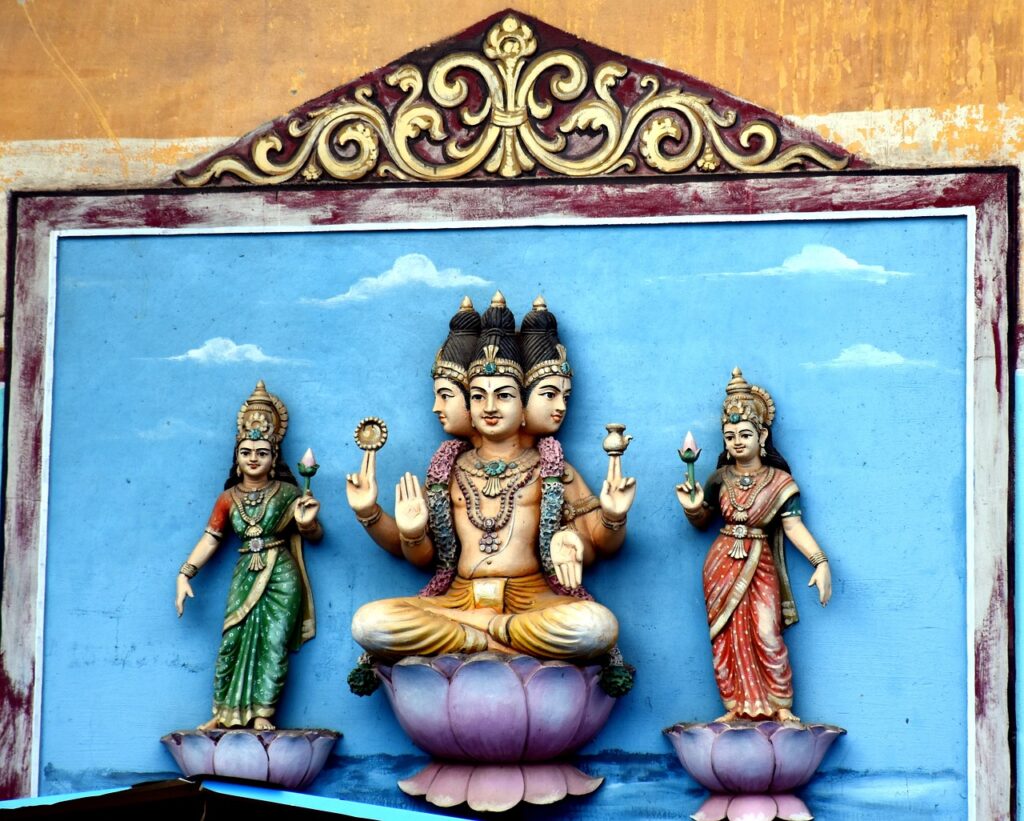
Categories
Ahamkara (अहंकारम्)
Ahamkara is an indigenous Indian concept related to self and identity.Click to learn more
Anavrtti (अनावृत्तिः)
Anavrtti (Sanskrit: अनावृत्ति) is a Vedic term which means – non-return to a body, final emancipation. Click to learn more
Aila Gita (ऐलगीता)
A philosophical discourse from the Markandeya Purana about King Ila’s spiritual realization. Click to learn more
Aitareya Upanishad (ऐतरेय उपनिषद्)
An Upanishad discussing the origin of the universe and the nature of consciousness. Click to learn more
Anavrtti (अनावृत्तिः)
The state of non-return, often referring to liberation (Moksha) in Vedanta. Click to learn more
Antahkarana Chatushtaya (अन्तःकरणचतुष्टयम्)
The fourfold inner instrument of the mind: Manas, Buddhi, Chitta, and Ahamkara. Click to learn more
Anubandha Chatushtaya (अनुबन्धचतुष्टयम्)
The fourfold requisites for studying Vedanta: subject, purpose, connection, and eligibility. Click to learn more
Aparoksha (अपरोक्षम्)
Direct, immediate knowledge, especially of the Self or Brahman. Click to learn more
Asat (असत्)
Non-existence or illusion, often contrasted with Sat (absolute reality). Click to learn more
Atman (आत्मन्)
The true self or soul, which is eternal and identical with Brahman. Click to learn more
Bhagavad Gita (भगवद्गीता)
A sacred Hindu scripture, part of the Mahabharata, offering philosophical and spiritual guidance. Click to learn more
Bhakti (भक्तिः)
Devotional love and surrender to God, central to Bhakti Yoga. Click to learn more
Brahman (ब्रह्मन्)
The ultimate, formless, and infinite reality in Hindu philosophy. Click to learn more
Brahmasutra (ब्रह्मसूत्र)
A foundational Vedantic text summarizing Upanishadic teachings. Click to learn more
Brahmatattva (ब्रह्मतत्वम्)
The essential nature or principle of Brahman. Click to learn more
Brahmavidya (ब्रह्मविद्या)
The knowledge of the absolute reality, Brahman. Click to learn more
Brhadaranyaka Upanishad (बृहदारण्यकोपनिषद्)
One of the oldest Upanishads discussing self-knowledge and liberation. Click to learn more
Brihadaranyaka Upanishad (बृहदारण्यक उपनिषद्)
Another spelling for Brhadaranyaka Upanishad. Click to learn more
Chakras (चक्राणि)
Energy centers in the human body, crucial in yoga and tantra. Click to learn more
Chandogya Upanishad (छान्दोग्योपनिषतद्)
An Upanishad focusing on metaphysical concepts like Om and Brahman. Click to learn more
Chidakasha (चिदाकाशः)
The infinite space of pure consciousness. Click to learn more
Chinta (चिन्ता)
Worry or contemplation, often seen as an obstacle in spiritual growth. Click to learn more
Chitta (चित्तम्)
The mind-stuff responsible for memory and thought processing. Click to learn more
Chitta Bhumis (चित्तभूमयः)
The different states of mind in Yogic psychology. Click to learn more
No information available at this time.
No information available at this time.
No information available at this time.
Guna Traya Vibhaga Yoga (गुणत्रयविभागयोगः)
A chapter in the Bhagavad Gita explaining the three gunas (Sattva, Rajas, Tamas). Click to learn more
No information available at this time.
Indian Concept of Self
The idea of self in Indian philosophy, often linked to Atman and Brahman. Click to learn more
Ishavasya Upanishad (ईशावास्य उपनिषद्)
An Upanishad teaching the unity of all existence under Ishvara. Click to learn more
Jagat (जगत्)
The material world, often considered transient and illusory. Click to learn more
Jijnasa (जिज्ञासा)
The desire to know, especially regarding ultimate reality. Click to learn more
Jiva (जीवः)
The individual soul, bound by karma and illusion. Click to learn more
Jivanmukta (जीवन्मुक्तः)
A liberated being who attains freedom while still alive. Click to learn more
Jnana Bhumikas (ज्ञानभूमिकाः)
The stages of knowledge leading to self-realization. Click to learn more
Karma (कर्म)
The law of cause and effect governing actions and their consequences. Click to learn more
Katha Upanishad (कठ उपनिषद्)
An Upanishad that narrates Nachiketa’s dialogue with Yama about the self. Click to learn more
Kena Upanishad (केन उपनिषद्)
An Upanishad discussing the source of consciousness. Click to learn more
Krodha (क्रोधः)
Anger, one of the obstacles to spiritual progress. Click to learn more
Krshna Upanishad (कृष्णोपनिषद्)
An Upanishad focusing on Lord Krishna’s divinity. Click to learn more
No information available at this time.
Mahavakyas (महावाक्यानि)
The great Vedantic statements revealing Brahman-Atman unity. Click to learn more
Mandukya Upanishad (माण्डूक्य उपनिषद्)
An Upanishad explaining the four states of consciousness. Click to learn more
Mauna (मौनम्)
Silence, often practiced as a form of spiritual discipline. Click to learn more
Maya (माया)
The illusion that veils the true nature of reality. Click to learn more
Moksha (मोक्षः)
Liberation from the cycle of birth and death. Click to learn more
Mukhya Upanishads (मुख्य उपनिषद्)
The principal Upanishads forming the foundation of Vedanta. Click to learn more
Mundaka Upanishad (मुण्डक उपनिषद्)
An Upanishad emphasizing renunciation and self-knowledge. Click to learn more
Nachiketa (नचिकेताः)
The seeker in Katha Upanishad who inquires about the afterlife. Click to learn more
Narada Sanatkumara Samvada (नारदसनत्कुमारयोः संवादः)
Navavidha Bhakti (नवविधाभक्तिः)
An Upanishad emphasizing renunciation and self-knowledge. Click to learn more
Nihshreyasa (निःश्रेयसम्)
The highest good or ultimate spiritual goal. Click to learn more
Nishkama Karma (निष्कामकर्म)
Selfless action performed without attachment to results. Click to learn more
No information available at this time.
Para Vidya (पराविद्या)
The higher knowledge of the ultimate reality. Click to learn more
Paroksha (परोक्षम्)
Indirect or inferred knowledge. Click to learn more
Pranava (प्रणवः)
The sacred syllable “Om,” representing ultimate reality. Click to learn more
Prashna Upanishad (प्रश्न उपनिषद्)
An Upanishad answering fundamental spiritual questions. Click to learn more
Prasthana Trayi (प्रस्थानत्रयी)
The three foundational texts of Vedanta (Upanishads, Bhagavad Gita, Brahmasutra). Click to learn more
Pravrtti and Nivrtti (प्रवृत्ति और निवृत्ति)
Selfless action performed without attachment to results. Click to learn more
Pravrtti and Nivrtti (प्रवृत्तिः निवृत्तिः च)
Pravṛtti is worldly action; Nivṛtti is renunciation. Click to learn more
Purusha (पुरुषः)
The cosmic self or pure consciousness. Click to learn more
Purushartha (पुरुषार्थ:
The four goals of human life: Dharma, Artha, Kama, and Moksha. Click to learn more
No information available at this time.
Ramanujacharya (रामानुजाचार्यः)
A Vedantic philosopher who advocated Vishishtadvaita (qualified non-dualism). Click to learn more
Relationship of Atman and Brahman
The philosophical inquiry into the connection between the individual soul and ultimate reality. Click to learn more
Sadhana (साधनम्)
Spiritual discipline or practice. Click to learn more
Sadhana and Indian Psychology (साधनं मनोविज्ञानं च)
The psychological dimensions of spiritual practice. Click to learn more
Sadhana Chatushtaya (साधनचतुष्टयम्)
The fourfold qualifications for Vedantic study. Click to learn more
Sadhana in Sampradayas (सम्प्रदायेषु साधनम्
Different approaches to spiritual discipline across traditions. Click to learn more
Sadhana Saptaka (साधनसप्तकम्)
The sevenfold path of spiritual discipline. Click to learn more
Sanskrit and Bharat (संस्कृतं भारतञ्च)
The connection between Sanskrit and Indian heritage. Click to learn more
Sat (सत्)
Existence or absolute reality. Click to learn more
Shadurmi (षडूर्मिः)
The six waves of human suffering (hunger, thirst, sorrow, etc.). Click to learn more
Sharira Traya (शरीरत्रयम्)
The three bodies: gross, subtle, and causal. Click to learn more
Shraddha (श्रद्धा)
Faith and devotion in spiritual pursuit. Click to learn more
Shraddha Traya Vibhaga Yoga (श्रद्धात्रयविभागयोगः)
A chapter in the Bhagavad Gita classifying faith into three types. Click to learn more
Shravana (श्रवणम्)
Listening to spiritual teachings as a means of learning. Click to learn more
Shreyas and Preyas (श्रेयः प्रेयः च)
The distinction between the ultimate good and immediate pleasure. Click to learn more
Sukha and Ananda (सुखानन्दश्च)
The difference between worldly happiness and spiritual bliss. Click to learn more
Svasthya (स्वास्थ्यम्)
Well-being or balance in body and mind. Click to learn more
Taittriya Upanishad (तैत्तिरीय-उपनिषद्)
An Upanishad exploring the nature of Brahman and bliss. Click to learn more
Tattva-viveka Prakriyas in Vedanta (वेदान्ते तत्वविवेक-प्रक्रियाः)
Methods of discerning reality in Vedanta. Click to learn more
Upadhi (उपाधिः)
The limiting adjuncts that obscure true knowledge. Click to learn more
Upanishads (उपनिषदः)
Philosophical scriptures exploring the nature of reality and self. Click to learn more
Upanishads (उपनिषद्)
Philosophical scriptures exploring the nature of reality and self. Click to learn more
Vagambhrniya Sukta (वागाम्भृणीयसूक्तम्)
A hymn celebrating the power of speech and wisdom. Click to learn more
Vishaya (विषयः)
The objects of perception or knowledge. Click to learn more
No information available at this time.
No information available at this time.
No information available at this time.
No information available at this time.
